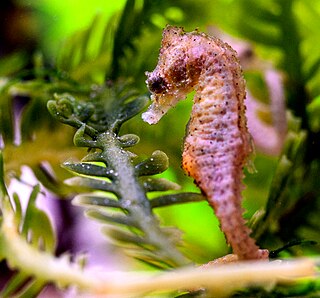Related Research Articles

A seahorse is any of 46 species of small marine bony fish in the genus Hippocampus. "Hippocampus" comes from the Ancient Greek hippókampos (ἱππόκαμπος), itself from híppos (ἵππος) meaning "horse" and kámpos (κάμπος) meaning "sea monster" or "sea animal". Having a head and neck suggestive of a horse, seahorses also feature segmented bony armour, an upright posture and a curled prehensile tail. Along with the pipefishes and seadragons they form the family Syngnathidae.

The Syngnathidae is a family of fish which includes seahorses, pipefishes, and seadragons. The name is derived from Ancient Greek: σύν, meaning "together", and γνάθος, meaning "jaw". The fused jaw is one of the traits that the entire family have in common.

Barbour's seahorse is a species of fish of the family Syngnathidae.

The dwarf seahorse is a species of seahorse found in the subtidal aquatic beds of the Bahamas and parts of the United States. It is threatened by habitat loss. According to Guinness World Records, it is the slowest-moving fish, with a top speed of about 5 feet (1.5 m) per hour.
Alkalimarinus is a Gram-negative genus of bacteria from the class of Alteromonadaceae with one known species. Alkalimarinus sediminis has been isolated from sediments from the coast of Weihai in China.
Gramella aestuariivivens is a Gram-negative, aerobic and non-spore-forming bacterium from the genus of Gramella which has been isolated from tidal flat sediments from the South Sea in Korea.
Gramella aquimixticola is a Gram-negative, non-spore-forming aerobic and motile bacterium from the genus of Gramella which has been isolated from estuary water from Hwajinpo in Korea.
Gramella lutea is a Gram-negative, aerobic, rod-shaped and non-motile bacterium from the genus of Gramella which has been isolated from marine sediments from Hwangwooji from the Jeju island.
Lutibacter holmesii is a Gram-negative, strictly aerobic, rod-shaped and non-motile bacterium from the genus of Lutibacter which has been isolated from a sea urchin from the Troitsa Bay in the Sea of Japan.
Lutibacter oricola is a Gram-negative, aerobic, rod-shaped and non-motile bacterium from the genus of Lutibacter which has been isolated from seawater from Seo-do from the Liancourt Rocks.
Mesonia is a strictly aerobic and chemoorganotrophic genus of bacteria from the family of Flavobacteriaceae.
Mesonia algae is a Gram-negative, aerobic, moderately halophilic, heterotrophic and non-motile bacterium from the genus of Mesonia which has been isolated from the alga Acrosiphonia sonderi.
Mesonia aquimarina is a Gram-negative, aerobic and rod-shaped bacterium from the genus of Mesonia which has been isolated from the coast of the Sea of Japan.
Mesonia maritima is a Gram-negative, aerobic and rod-shaped bacterium from the genus of Mesonia which has been isolated from seawater from the South Sea.
Mesonia mobilis is a Gram-negative, strictly aerobic, heterotrophic, chemoorganotrophic and motile bacterium from the genus of Mesonia which has been isolated from seawater.
Mesonia oceanica is a Gram-negative, aerobic, rod-shaped, chemoorganotrophic, slightly halophilic and non-motile bacterium from the genus of Mesonia which has been isolated from seawater from the Atlantic.
Mesonia ostreae is a Gram-negative and aerobic bacterium from the genus of Mesonia which has been isolated from seawater from an oyster farm from the South Sea.
Mesonia phycicola is a Gram-negative, aerobic and non-motile bacterium from the genus of Mesonia which has been isolated from seaweed near Mara Island.
Winogradskyella crassostreae is a Gram-negative, aerobic and rod-shaped bacterium from the genus Winogradskyella which has been isolated from a Pacific oyster.
Winogradskyella litoriviva is a Gram-negative, facultatively anaerobic and moderately halophilic bacterium from the genus Winogradskyella which has been isolated from seawater from the coast of Troitsa Bay.
References
- 1 2 "Species: Mesonia hippocampi". LPSN.DSMZ.de.
- 1 2 Kolberg, Judy; Busse, Hans-Jürgen; Wilke, Thomas; Schubert, Patrick; Kämpfer, Peter; Glaeser, Stefanie P. (1 July 2015). "Mesonia hippocampi sp. nov., isolated from the brood pouch of a diseased Barbour's Seahorse (Hippocampus barbouri)". International Journal of Systematic and Evolutionary Microbiology. 65 (Pt_7): 2241–2247. doi: 10.1099/ijs.0.000245 . PMID 25862387.
- ↑ "www.uniprot.org".
{{cite journal}}: Cite journal requires|journal=(help) - ↑ Parker, Charles Thomas; Garrity, George M. (2008). Parker, Charles Thomas; Garrity, George M (eds.). "Taxonomy of the species Mesonia hippocampi Kolberg et al. 2015". doi:10.1601/tx.26910.
{{cite journal}}: Cite journal requires|journal=(help)